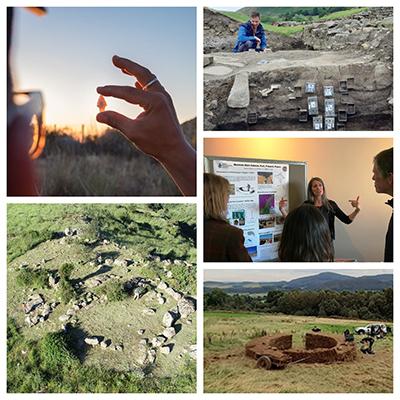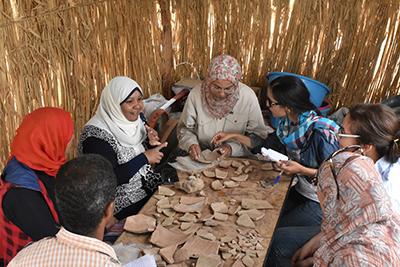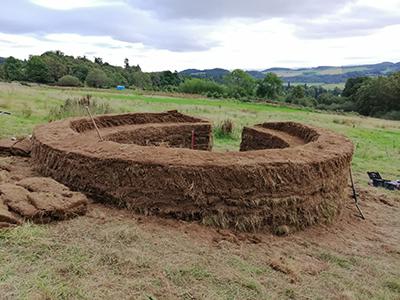Archaeology REF results
Archaeology research within the School spans the globe and the whole of human past, joining with colleagues across the University to transform the future.

Archaeology at Edinburgh – Interdisciplinary strength
Our research activity extends across Eurasia, Africa and the Americas, and spans the whole human past from the Stone Age up to the present day. Archaeology at Edinburgh has particular strengths in European prehistory, Mediterranean archaeology, osteoarchaeology, isotope geochemistry, coastal and marine archaeology, and cultural heritage studies. Our research is challenge-led and considers how past data and practice can inform solutions to modern problems such as climate change, health, conflict, infrastructural development, increasing urbanisation, and identity building as well as how heritage can create tangible benefits for local communities and marginalised communities. Recent growth has included recruiting staff in global challenges, computational archaeology, prehistoric Scotland as well as Heritage, Text and Data Mining. We have a strong focus on supporting Early Career Researchers.
We have a dynamic and strongly interdisciplinary research culture. This is represented in the vital contributions that Archaeology staff made to four submissions across the Arts, Humanities, and Sciences in the Research Excellence Framework (REF2021), the UK’s system for assessing the quality of research in UK higher education institutions. These include significant contributions to the REF21 profiles of Classics, History, Earth Systems, and Anthropology, all of whom are leaders in their field, sitting within the top five in the UK for breadth and quality of research (THE RP rank).
The contemporary relevance and wider societal contributions of our research is evident in the impact case studies submitted by Archaeology staff. These include the conservation and management of heritage in Egypt and how today’s sustainable construction practices can be informed by prehistoric building techniques.
Looking forward, we are expanding this focus on using the past to inform contemporary practice. The GCRF Network+ Rising from the Depths project, for example, is based in Edinburgh and co-ordinates a range of projects in eastern Africa that are using marine cultural heritage to create sustainable economic, social and cultural benefits for at-risk coastal communities. Further, Beyond Walls: Reassessing Iron Age and Roman Encounters in Northern Britain, a project aiming to transform our understanding of Rome’s impact on northern Britain, also contributes to the wider subject of cultural encounters on the edges of empires, both past, and present.
Find out more about just two of the projects below.
Conservation, management and capacity building for prehistoric and early historic Egyptian heritage
Dr Joanne Rowland – Senior Lecturer in Archaeology
The impact of the research

Dr Rowland’s research into two prehistoric sites – Merimde Beni Salama and Naqada – provides new insights into the processes that led to the establishment of Egypt as the world’s first nation-state, and helped protect the sites by raising awareness of them within Egypt and the wider world, and aiding the Ministry of Tourism and Antiquities in preserving and interpreting them. Dr Rowland's achievements were recognised with her shortlisting for the Newton Prize 2020. The award ‘celebrates outstanding international research partnerships that play an important role in addressing challenges in developing countries and around the world’.
Newton Prize
Earliest Egypt: Conservation, Management, Valorisation and Capacity Building
Imbaba Governorate Prehistoric Survey
Read more on work in this area
Providing new skills in cultural heritage management and context and object identification to preserve and interpret prehistoric sites across Egypt
Training for Egyptian Ministry of Tourism and Antiquities inspectors
More on Dr Joanne Rowland
Using prehistoric building techniques to inspire sustainable modern construction and protect local heritage in Scotland
Dr Tanja Romankiewicz - Chancellor's Fellow in Archaeology
The impact of the research

Dr Romankiewicz’s research on prehistoric architectures in northwest Europe has transformed the way that builders, visitors and heritage professionals understand sustainable building practices from the distant past. Eco-building projects in the Netherlands and Scotland have used her findings on sustainability in prehistoric architecture as the basis for moving towards zero-carbon construction methods. In the Heritage sector, her research has formed the basis for new interpretation displays and reconstructions from Shetland to Galloway, helping to drive an increase in visitor numbers. Policy guidance produced by Dr Romankiewicz in collaboration with Aberdeenshire and Highland Councils has made possible the curation of more effective regional and national heritage records for the future.
University of Edinburgh
Turf - the ancient way to build a better future
Dr Tanja Romankiewicz - Dutch National Archaeology Days

